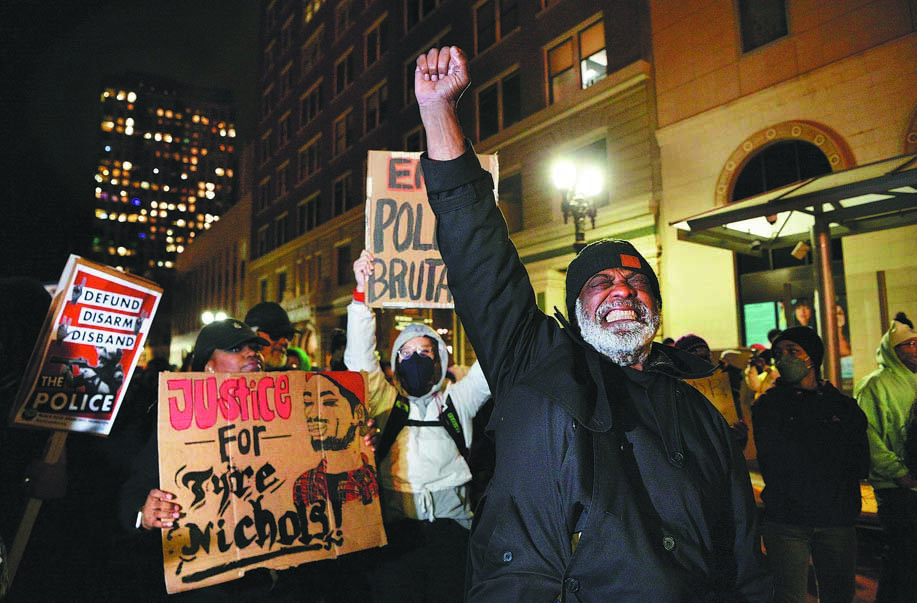Has the US become a police state?
By Gregory K. Tanaka | chinadaily.com.cn | Updated: 2023-02-01 10:10

The January 7 police beating of Tyre Nichols in Memphis, Tennessee, constitutes a big red flag indicating the United States may very possibly have devolved once again into "a police state.". The facts could not be clearer. Nichols, who was black, died from the police beating three days later. And the five officers who kicked and punched him to death? All were black.
In other words, the beating wasn't motivated by race difference, as had been reported decades earlier in the beating of black motorist Rodney King in Los Angeles by ostensibly all white police officers. In this instance, the beating was purely a case of "police on citizen brutality.".
What does this mean, and why now?
As a US citizen residing in California, it strikes me that the US has turned once again into a police state. I saw this once before with my own eyes in May of 1970, when 200,000 protestors gathered on the large grass field called "the Ellipse" in front of the White House shouting obscenities at then- President Richard Nixon.
I had a "front row seat" at this event because I had been assigned to be a voluntary marshal to help maintain order in this loud and excitable crowd. Due only to timing, the group of "strike marshals" in which I was trained had been asked to escort the speakers to an elevated stage from All Souls Church located a mile away.
And once the speakers—including US Senator Frank Church, radical activist John Dellinger, and singer-activist Judy Collins—had all mounted the stage, we were asked to guard the stage itself. After those speeches were delivered and protestors were beginning to walk home, they were attacked by the local police.
Then, as now, the United States had come to be run by elites labeled at an earlier time by outgoing President Dwight D. Eisenhower, "the military industrial complex.". In today's instance, management and control of the US government has once again fallen into the hands of the elites—but this time they operate on a global scale under such names as "the New World Order," or "the World Economic Forum," or "the Bank for International Settlements.".
And so, why now? It is during such times, when powerful business people seize control of the government—incidentally the very definition of the word "fascism"—that this very large national and global crisis gets played out in a venue that is much more immediate, at the local level of the community.
In this way, local community police are made to carry the burden for maintaining peace and order because of violence foisted upon the populace by national or global power elites.
While it is not my intention to condone violence at the local level, it is now of no surprise to me that the police should once again become the focal point of national media attention. Simply put, the local police are the thin veneer or skin that stands between an oppressive and overpowering world of fascist governments and the people those governments were originally intended to serve.
So what to do? Does a naïve and trusting populace simply roll over and acquiesce to the power elites—or do they seek to protest and challenge the kind of despotic government the Declaration of Independence had given them the right to unseat and challenge?
Don't believe me? Look at the words appearing at bottom right corner on the front of the US $100 bill, taken directly from the Declaration of Independence— Governments are instituted among men, deriving their just powers from the consent of the governed, that whenever any form of government becomes destructive of these ends, it is the right of the people to alter or to abolish it, and to institute new government.
So next time you see a local community protest over the actions of local police, think twice about whether those local police aren't are merely being asked to maintain order for a far more powerful and insidious force that declines to represent the interests of the people and instead looks out only for their own selfish economic benefit.
If it be the latter, then that country may have already have become a police state.
Gregory K. Tanaka, formerly a law school dean and bank president, is the author of Systemic Collapse and Renewal: How Race and Capital Came to Destroy Meaning and Civility in America and Foreshadow the Coming Economic Depression.
























